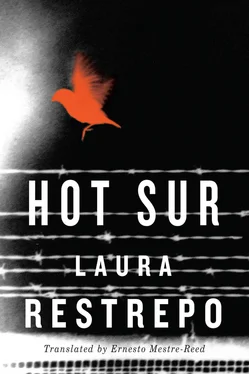The unusual cases are just that, unusual; loneliness, on the other hand, is everywhere. And I learned another important lesson the time I saw the girl bound with wire. I learned to keep what I saw to myself, because my job wasn’t to be a Good Samaritan or to save souls. I never called the police or stuck my nose in people’s business, except when I noticed that children or animals were being mistreated: that’s where I drew the line. Children covered in filth because of parental neglect, dogs locked up in a patio howling from abandonment, those kinds of things. Those I did report, at least. Because if there is something I can’t stand it’s the smell of sadness in children and animals.
Anything that has to do with cleanliness I’m interested in. I didn’t spend all those years investigating people’s hygienic habits for no reason. Hygiene and filth, two sides of the same coin. You might think that it’s nonsense to go around asking people whether they use OxiClean or Shout to wash out stains on their clothes, or if they buy toothpaste with fluoride or baking soda. Maybe you think it’s silly, not very interesting, but it actually was. One time I was questioning a graphic designer. It was unusual for men to agree to be interviewed, but you could get them by offering coupons as motivation. Coupons for food at a certain market or for gasoline at a certain station. Anyhow, this guy was around forty, divorced. His name was Paul, I still remember, his name is seared in my mind. We were in the kitchen of his apartment and I was asking him questions, nothing special, same as always. “Do you use anything to whiten your clothes?” Things like that, and the guy comes out with the following: he tells me that when he was a teenager he discovered that his mother would remove the pillowcases from his and his brother’s pillows and wash them. He and his brother snorted a lot of coke and their noses bled. At night, the blood would stain the pillowcases and every morning the mother would get up to wash them. He imagined that his mother did it so her husband wouldn’t see the stains, or maybe even so that he and his brother wouldn’t see them.
On another occasion, I was right in the middle of the bit with the six undershirts, and the woman I was interviewing all of a sudden begins to weep buckets. The bit with the six undershirts entails arriving at a house with a bag that contains six undershirts of different grades of white. They’re numbered so that the person classifies them from the cleanest to the dirtiest. So there I was with this woman, young, very white features, comfortably middle class. I took out the undershirts, and as she inspected them one by one she told me, “This one is filthy, this one smells funny, this looks yellow under the arms, number three is not bad. In fact, I’d say number three is the cleanest, or wait, maybe not, when you look at it closely there’s a small stain here. Let me look again, perhaps the cleanest one is four.” And so on. I thought that she even looked like she was enjoying the whole game thing when she started crying and crying and crying, and there wasn’t anything I could do to console her. I asked her what was wrong, patted her on the back. “Please don’t cry; it can’t be so bad.” But she didn’t stop. So I called Corina, my colleague, who was surveying another resident in the same block. “Cori, girl,” I told her on the cell, “come help me deal with this case of major depression.” I stayed with the weeping woman while Cori went to the grocery store around the corner to get an apple treat, saying it would calm her down. As we prepared the tea after Cori returned, the woman I was interviewing strips off the turtleneck she’s wearing, unclasps her bra and takes it off… and she shows us. There was a bright red stain that started at her neck, covered the left side of her chest completely, and continued downward toward her waist. But it wasn’t a plain smooth red mark, no, not that at all. It was a fucking thing in and of itself, truly monstrous, the skin thickened and solid — think of the mark of Cain but a grotesque version. It was a severely malformed growth, to put it plainly, of such a nature that Cori and I grew pale when we saw it.
“And this stain? How do I get it off? You know so much about stains, can you tell me how to get this off?” the woman asked Cori and me, continuing to cry. Now it was her asking the questions, so painful and fucked up that Cori and I had no idea how to answer.
Those were the kinds of things we would see, not every day, but often enough. Cori told me she once interviewed a woman who told her that her boyfriend liked for her to urinate in his mouth, and that it wasn’t dirty for her but exciting.
“You see?” Cori, who had been at the job longer than I had, told me. “See? Each human being has a way of deciding what’s dirty and what’s not, in that matter there are no rules.”
And I’ll say it again, the best thing about that job was the friendships with my coworkers, especially the six closest: Jessica — although she worked somewhere else — Juanita, Sandra, Sofia, Cori, and Margo. And me, of course, I was the seventh, and the seven of us were inseparable, think of the days of the week or of Snow White’s dwarves. But my favorite one without a doubt was Cori. She wasn’t pretty but she was brave, sharp, supportive, a good worker, a good friend, and with a sense of humor. That was the best thing about Cori; she knew how to laugh. I’m talking about a big woman here, that’s what Cori was. Her full name was Corina Armenteros, and that’s still her name today, although she has returned to Chalatenango, in El Salvador. She had an Achilles’ heel, my friend, my friend Cori, a single weakness: she wasn’t pretty. Don’t get me wrong, she wasn’t ugly or unpleasant either, she simply wasn’t pretty, and this made her life harder. A hard life like the rest of us. She had been raped when she was fifteen, back in Chalatenango, and a child had been born of that situation, Adelita, who stayed with her grandmother when Cori decided to try her luck in America. Adelita was everything to Cori: her daughter, her life, her eyes, and her ears and only love. “Look out!” we’d say. “Run while you can. Cori’s at it again with Adelita’s pictures.” Because she’d pull them out at the slightest pretext to show them to whoever was there. Cori wasn’t my friend; she was my sister, even more so than my blood sister, whom I loved more than anything in the world. But you couldn’t count on Violeta, and I’m not condemning her, that’s just how she was, maybe because of her illness. On the other hand, I trusted Cori with my life and she trusted me with hers. But as bad luck would have it, I wasn’t there for her when she really needed me and that soured our friendship, and was ultimately, or at least I think this is so, what made her return to El Salvador.
I wasn’t with her, and did not behave my best under the circumstances. She had been thinking for a long time about returning; from the day I met her, she had dreamed of going back because she couldn’t stand being so far from away from her daughter, the thought of not seeing her grow, not being by her side to protect her in case of need. What happened that night pushed her to take action. And it was my fault. What happened that night. But I’ll tell you one thing, Mr. Rose. Cori didn’t deserve it. Nobody deserves things like that, least of all her. You’ll see. It’s not as if Cori had an explosive sex life. I imagine a lot of factors could have influenced what happened: the rape at such a young age, the lack of confidence in her body, a life dedicated to work, all of this combined to make her a rather demure girl, not a lot of parties, drank very little, no sex. Greg, my husband, liked her; he, who watched over even my female friends, was always glad to see Cori because she knew how to talk to him. She asked him about his time as a policeman, talked to him about politics, Vietnam, and Korea. Like I said, Cori was bright and well informed. One day, I decided to introduce her to Sleepy Joe, my brother-in-law, Greg’s younger brother. She was single and so was he, although you never could tell with him, his civil status has always been uncertain and fluid. But at that time he wasn’t seeing anyone on a steady basis, at least not publicly. So I had the brilliant idea to introduce them and I began to devise a plan to bring them together. Greg had no opinion either way; it was all the same to him, although he did warn me that these things don’t usually work. “He’s a peach,” I told Cori about Sleepy Joe, and told Joe the same thing about Cori. And I wasn’t lying, at least about Joe I wasn’t lying, damn, if that boy wasn’t fine, a tasty papi by any measure. A white boy, but yummy, looked like Viggo Mortensen, one of those who arrived from the poor side of Europe, a country named Slovakia, where his parents were from, although he had been born in Colorado, just like my Greg. That’s the picture I painted for Cori when I proposed the blind date, but she didn’t know who Viggo Mortensen was, had never seen one of his films or heard of Slovakia. We would go to the movies at four, Greg and me, her and Joe.
Читать дальше












